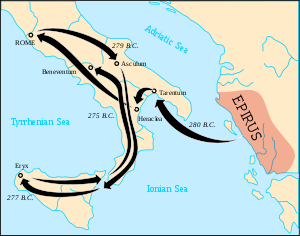Pyrrhic War
| Pyrrhic War | |||||||||
|---|---|---|---|---|---|---|---|---|---|
| Part of Roman expansion in Italy | |||||||||
 The route of Pyrrhus of Epirus during his campaigns in southern Italy and Sicily. | |||||||||
| |||||||||
| Belligerents | |||||||||
| |||||||||
| Commanders and leaders | |||||||||
| Pyrrhus of Epirus |
| ||||||||
| Casualties and losses | |||||||||
|
| ||||||||
The Pyrrhic War (280–275 BC) was mostly fought between the Roman Republic and Pyrrhus, the king of Epirus. he was a distant relative of Alexander the Great. The people of the Greek city of Tarentum in southern Italy asked him to help them in their war against the Romans.
He was a skilled commander, with a strong army supported by war elephants. The Romans were not used to them. Pyrrhus beat the Roman legions, but suffered heavy losses even when he won. Plutarch wrote that Pyrrhus said after the second battle of the war, "If we are victorious in one more battle with the Romans, we shall be utterly ruined." The Romans had plenty of military manpower and could replace their losses. This is the source of the expression "Pyrrhic victory", a victory that inflicts losses the winner cannot afford in the long term.
Worn down by the battles against Rome, Pyrrhus moved his army to Sicily to fight the Carthaginians instead. After several years of campaigning there (278–275 BC), he returned to Italy in 275 BC, where the last battle of the war was fought. The Roman victory. Following this, Pyrrhus returned to Epirus, ending the war. Three years later, in 272 BC, the Romans captured Tarentum.
